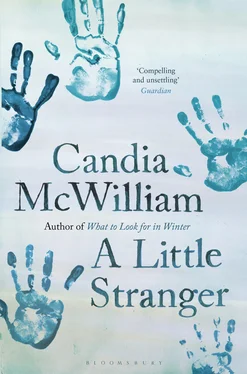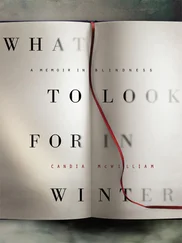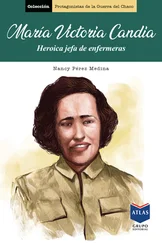Candia McWilliam - A Little Stranger
Здесь есть возможность читать онлайн «Candia McWilliam - A Little Stranger» весь текст электронной книги совершенно бесплатно (целиком полную версию без сокращений). В некоторых случаях можно слушать аудио, скачать через торрент в формате fb2 и присутствует краткое содержание. Год выпуска: 2011, Издательство: Bloomsbury UK, Жанр: Современная проза, на английском языке. Описание произведения, (предисловие) а так же отзывы посетителей доступны на портале библиотеки ЛибКат.
- Название:A Little Stranger
- Автор:
- Издательство:Bloomsbury UK
- Жанр:
- Год:2011
- ISBN:нет данных
- Рейтинг книги:3 / 5. Голосов: 1
-
Избранное:Добавить в избранное
- Отзывы:
-
Ваша оценка:
- 60
- 1
- 2
- 3
- 4
- 5
A Little Stranger: краткое содержание, описание и аннотация
Предлагаем к чтению аннотацию, описание, краткое содержание или предисловие (зависит от того, что написал сам автор книги «A Little Stranger»). Если вы не нашли необходимую информацию о книге — напишите в комментариях, мы постараемся отыскать её.
A Little Stranger — читать онлайн бесплатно полную книгу (весь текст) целиком
Ниже представлен текст книги, разбитый по страницам. Система сохранения места последней прочитанной страницы, позволяет с удобством читать онлайн бесплатно книгу «A Little Stranger», без необходимости каждый раз заново искать на чём Вы остановились. Поставьте закладку, и сможете в любой момент перейти на страницу, на которой закончили чтение.
Интервал:
Закладка:
I was glad Margaret had made friends. In the evening she might meet the other nannies and they would see a film or go out to eat. Those nannies who were her particular friends tended to be those whose employers were our particular friends.
The children got on well, only ever divided, and that briefly, over possessions.
When other children came to see John, to play with his toys or in his birthday-garden, the nannies talked among themselves. They required music all day; the nursery radio played, unlistened to but never unheard, murmurous and inoffensive. John learnt words from the radio; he knew chart positions and dated words of soft hip slang. He described things as ‘fab’ and ‘really over the top’. On Margaret’s day off there was no radio until my husband came home and listened to the shipping forecast. John loved this; he sat, quite silent, with his father, a careworn expression on his uncreaseable brow. He also admired newspapers for their evident importance in the world where things were heavier to bear and trousers and silences were long.
Like many children’s, John’s first interjection had been ‘Oh dear’. It is what first children hear that parents replace more forceful oaths with, a soft oath, a nursery lament, and from this they learn that life is a dangerous business, though we tell them before they sleep that elephants use lifts and rabbits wear blue coats with brass buttons.
Naturally, the nannies gossiped. I and my friends knew this because some of these friends gossiped with their nannies. It was cosy talk, scandal with milk, of babies, fiancés, naughtiness. Perks were compared, skiing holidays, access to video recorders, horses, time off. Wages, of course, and clothes, which were swapped for special parties. The main topic, however, seemed to be weight.
It did not seem to be the case that a nanny was a necessarily maternal woman. Margaret said that she and her nanny-friends (she described them thus, like nanny-goats) all agreed that they would not care to have children unless they had a nanny. Some of these young women were, like Margaret, saving to be married, others ‘did not like’ the idea of marriage. Two had even been told, according to Margaret, that they could not have children. I thought this sad and possibly dangerous, but she assured me that they felt no more intensely towards the children in their care than the fertile nannies felt. How she knew this, I could not imagine. ‘Fertile’ was her term, rhyming with ‘myrtle’.
Not that the point of life is reproduction, only its end; but has not a nanny chosen, at any rate temporarily, children as the point of her life?
I had often thought that most professionals did not in fact care for their parish, or patients, or clients, or material for these things’ own sake, but for the return they brought. What possible return could these ordinary, if fortunate, children offer?
Whether or not Margaret and her friends were maternal, they were intensely engaged in struggling with what are considered motherly figures.
I had been right about Margaret when I deduced that she frequently changed shape. Food was of great importance to her, as adversary and as preoccupation. At the moment she was winning her struggle with it. When John ate, she did not; so it was by authority rather than example that she showed him how and what to eat. He was a good eater, with a distaste for puddings.
Margaret loved sweet things and her shopping bags were full of those strange foods made for consumers addicted to bulk and sweetness but desirous of no nourishment. She bought those strange costly foods whose colours are of an unconvincing brightness. She drank chocolate milk so thick it resembled a bodily secretion, cheesecake which sighed to the knife. At the end of each day she calculated the value in calories of all she had eaten. The refrigerator in the nursery kitchen was full of bright drinks in clear vessels like aqualungs, and bread the colour of snow. For butter she had grease which reeked faintly of town water and her jam contained neither fruit nor sugar but was red as ric-rac. She did not seem to be aware that a lettuce and an omelette made from our own eggs would taste better and do her less harm than these weightless hefty meals of cloud and promise. In brown bags, John’s food had its own place in the refrigerator, unseductive and plain.
Our farm produced meat, the garden vegetables, we had milk and eggs and the cook made bread. I wondered sometimes whether these things were too physical for Margaret to bear.
In my pregnancy, I grew fatter at the waist and continued to eat, as I always had, fresh, clean food, pickled and salted to an alerting brackishness.
Chapter 6
Christmas consolidated the happiness in the house. I stopped worrying about our felicity and settled to getting and spending.
We had two Christmas trees that year, one for ourselves and one for John and Margaret. He had decorated their tree with baubles and tinsel, which Margaret had chosen. Their tree was gayer than our own. They had spent a morning in the local town choosing frosty globes enclosing Bambis, and clip-on birds with smooth glass-fibre brushes for tails. She had painted a crib-set and given the eaves of the stable glitterdust for snow. The manger had a nicely sewn duvet of straw-coloured cloth, the size of a pictorial rather than simply monarchist stamp.
‘I’m baby-minded,’ said Margaret, placing the infant Jesus.
She was to spend Christmas at her home.
‘We shall all miss you,’ I said, as we handed over our presents the evening before Christmas Eve. She had done more than she need to prepare things for us and was now driving off to help her parents with their celebrations. It was a strenuous time for her but she loved it. She had left a list for me, of outstanding preparations which could not be done too far in advance.
After we had said goodbye, John with kisses and my husband and I with boxed dainties and loud voices, I took out the list, which was written on her now-familiar paper. She dotted her ‘i’s with circles like birds’ eyes.
‘I wouldn’t lose her for all the world,’ said my husband, and he stretched and looked as self-satisfied as a painted paterfamilias.
I told him this. He was pleased and announced, ‘I’m looking forward to this Christmas more than to any other so far.’
I agreed.
I took Margaret’s list upstairs, where I went to turn off the tiny lights on John’s small tree, now he was asleep. The sense of suspended sweetness in the new dark was like a songbird covered with its dark night-time cloth.
The list read:
24th Dec. Remember to rest for baby. Feet up. Cook off. 8 pm, peel potatoes and put under water, Brussels peeled and x’d? 10 pm, Johnny’s stocking in my second drawer down. 11 pm, bird in slow oven of Aga. 12 pm, midnight mass. Say a prayer for Margaret!!
25th Dec. Bird in hot oven (did you take it out after mass?) at 10 am. 11 am, church. J.’s British warm airing in boiler room, shoes etc. ready. Collection in glove. 1 pm, eat a good dinner. No bread sauce. Onion bad for baby — and Mummy. 3 pm, John’s and my gift to you in nursery kitchen pan cupboard. 4 pm, no more than two (2) mince pies for J. No brandy butter. Custard ready in fridge. Does not eat skin. 6 pm, drinks tray for villagers ready, except ice.
26th Dec., ‘Boxing Day’. M. back. PHEW!
At the bottom, with the two ducks and their duckling, she had drawn a turkey, recognisable by his clerical wattles, uncooked, alive, raising his right drumstick in an avian — and presumably cannibalistic — grace.
I could not imagine what we would do without her.
Chapter 7
Asked about her own Christmas with her family, Margaret gave little away. It was as though her own home life did not enter the third dimension. She did not speak of her parents in the round. She appeared to have no childhood memories. When she released details, they were flat and lifeless as details from an instruction leaflet. It was as though she described self-assembly furniture. None the less, she wrote frequently to her family and to her boyfriend. She left her letters with mine, for the postman to pick up. My letters were to old friends, when they did not contain cheques.
Читать дальшеИнтервал:
Закладка:
Похожие книги на «A Little Stranger»
Представляем Вашему вниманию похожие книги на «A Little Stranger» списком для выбора. Мы отобрали схожую по названию и смыслу литературу в надежде предоставить читателям больше вариантов отыскать новые, интересные, ещё непрочитанные произведения.
Обсуждение, отзывы о книге «A Little Stranger» и просто собственные мнения читателей. Оставьте ваши комментарии, напишите, что Вы думаете о произведении, его смысле или главных героях. Укажите что конкретно понравилось, а что нет, и почему Вы так считаете.












